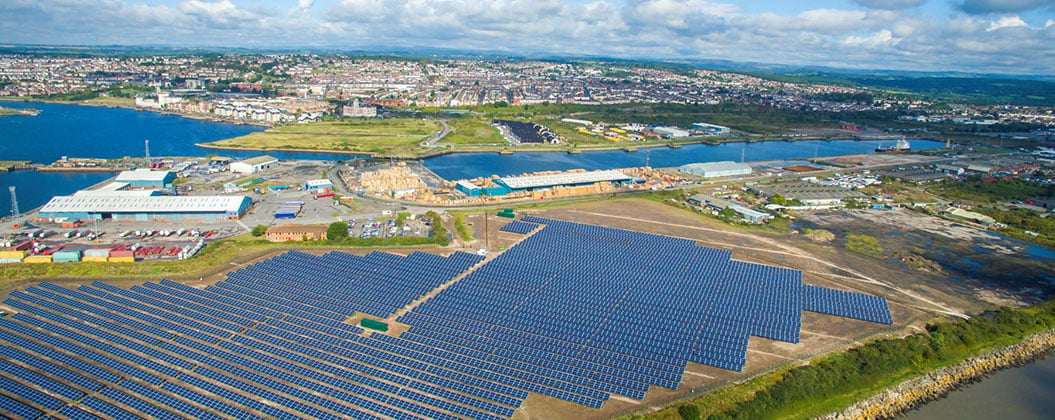Tim Morris, Chief Executive of the UK Major Ports Group, discusses how ports are rising up to meet the existential challenges presented by climate change and are becoming hubs for emissions reduction and nature recovery.
For millennia the UK’s ports have acted as the predominant hubs for trade with the world for our island nation. That remains the case today. But today that vital hub role is extending to meet the existential challenge facing us all – the crises facing the climate and nature.
The UK, already a world leader in offshore renewable energy generation, has hugely ambitious targets for further growth. The Prime Minister’s Ten Point Plan for a Green Industrial Revolution includes the goal of quadrupling how much electricity the UK produces from offshore wind turbine generation to 40GW by 2030. Development work is going on around the UK on other renewable marine-based energy generation technologies – wave and tidal power, for example. Carbon capture and storage, which is a key part of the net zero solution for some of the hardest sectors to decarbonise, will rely largely on undersea transport and storage. And the transition of the UK’s current offshore energy assets presents opportunities as well as challenges. What unites these major components of the UK’s net zero journey is the central role that is required from the nation's ports.
The UK ports sector has a long history of servicing the offshore oil and gas sector and now it is also showing its strengths in the offshore renewables industry. Ports have demonstrated their capability to support offshore energy projects across all phases of development. They’ve done this as locations for manufacturing and assembly of equipment such as turbines and blades. They’ve provided the landside centres for contractors, lay down and staging during the project development and build phases. Ports have also been ongoing bases for the operation and maintenance of offshore energy projects through their generation lives. Finally, they’ve also demonstrated this capability as locations for demobilisation, recovery and recycling at the end-of-the-life of projects.
Crucially, this proven capability is not just important for the UK in terms of meeting climate change goals. It is a sad fact that many of the UK’s most disadvantaged communities are clustered around the coast. The activity that has already taken place has led to well paid jobs – and the accompanying wider prosperity – in communities that have previously experienced declines in their traditional industries like fishing. The bold growth ambition the Government has set out should, if sufficient policy focus is given to capturing value for the UK, serve as a powerful stimulus to not only transform emissions for the better but jobs and opportunity in coastal communities as well.
As well as port's role as bases for the offshore renewable energy boom, they themselves are changing to play their own role in emissions reduction. Ports across the UK are grasping the opportunity of onsite renewable energy to deliver low-to zero-carbon energy for themselves and those operating on ports.
There are significant amounts of onshore wind and solar energy now, with the prospect of new energy sources such as hydrogen very much in prospect. This generation, together with an increasing focus on ‘smart’ energy management, points to a future where ports themselves are zero energy hubs, enabling resource efficient, zero emissions solutions. Investment in electric and hybrid equipment, or best in class propulsion technologies where electrification is not yet available, is a key priority for port operators in driving down their own direct emissions. New equipment, plus new ways of working and collaborating with supply chain partners are proving to be effective tools in driving down emissions and driving up air quality.
But true environmental sustainability is not just about emissions reduction, vital as it is. It must also be about nature recovery – for example biodiversity, habitat maintenance and regeneration. Here too ports are playing their role as custodians of their surroundings and exploring ways to increase this contribution, such as through the beneficial use of dredged materials and working with other partners in local environmental management groups.
So, ports already play a key role as hubs for sustainability. They are ambitious and well placed to grow this role. Maximising this potential relies not just on the ports but also the Government. Setting the right policy and regulatory frameworks that encourage sustainable development can not only result in better environmental outcomes but also boost jobs and prosperity for the UK. None of this is easy. But the dual prize must be worth working towards. The ports sector is ready to play its part. We look forward to working in partnership with Government in securing a more sustainable future.
Key points:
- Ports by their nature sit in the middle of a range of sustainability opportunities & challenges
- It's not just what they do themselves but what they facilitate for others
- This picture is aspirational, but there are examples of each activity today
- Reaching the full potential is ambitious & government needs to play its part


